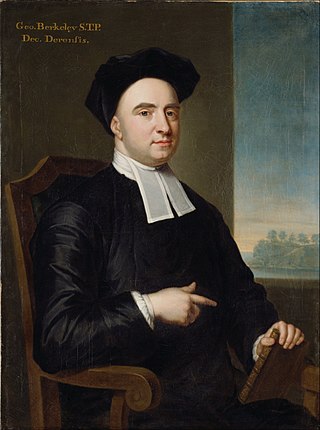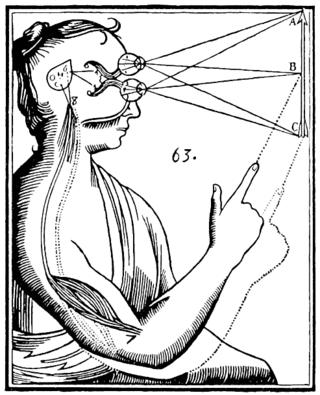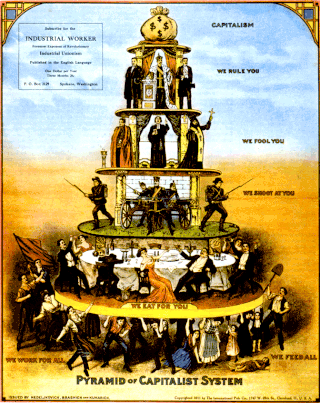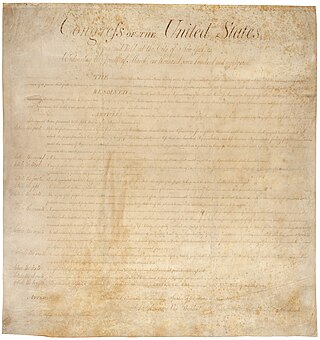Related Research Articles

George Berkeley – known as Bishop Berkeley – was an Anglo-Irish philosopher whose primary achievement was the advancement of a theory he called "immaterialism". This theory denies the existence of material substance and instead contends that familiar objects like tables and chairs are ideas perceived by the mind and, as a result, cannot exist without being perceived. Berkeley is also known for his critique of abstraction, an important premise in his argument for immaterialism.
Philosophy of religion is "the philosophical examination of the central themes and concepts involved in religious traditions". Philosophical discussions on such topics date from ancient times, and appear in the earliest known texts concerning philosophy. The field is related to many other branches of philosophy, including metaphysics, epistemology, logic and ethics.
Reality is the sum or aggregate of all that is real or existent within the universe, as opposed to that which is only imaginary, nonexistent or nonactual. The term is also used to refer to the ontological status of things, indicating their existence. In physical terms, reality is the totality of a system, known and unknown.
Solipsism is the philosophical idea that only one's mind is sure to exist. As an epistemological position, solipsism holds that knowledge of anything outside one's own mind is unsure; the external world and other minds cannot be known and might not exist outside the mind.
A belief is a subjective attitude that a proposition is true or a state of affairs is the case. A subjective attitude is a mental state of having some stance, take, or opinion about something. In epistemology, philosophers use the term "belief" to refer to attitudes about the world which can be either true or false. To believe something is to take it to be true; for instance, to believe that snow is white is comparable to accepting the truth of the proposition "snow is white". However, holding a belief does not require active introspection. For example, few individuals carefully consider whether or not the sun will rise tomorrow, simply assuming that it will. Moreover, beliefs need not be occurrent, but can instead be dispositional.

In the philosophy of mind, mind–body dualism denotes either the view that mental phenomena are non-physical, or that the mind and body are distinct and separable. Thus, it encompasses a set of views about the relationship between mind and matter, as well as between subject and object, and is contrasted with other positions, such as physicalism and enactivism, in the mind–body problem.

Debate is a process that involves formal discourse, discussion, and oral addresses on a particular topic or collection of topics, often with a moderator and an audience. In a debate, arguments are put forward for common opposing viewpoints. Debates have historically occurred in public meetings, academic institutions, debate halls, coffeehouses, competitions, and legislative assemblies. Debates have also been conducted for educational and recreational purposes, usually associated with educational establishments and debating societies. These debates emphasized logical consistency, factual accuracy, and emotional appeal to an audience. Modern forms of competitive debate also include rules for participants to discuss and decide upon the framework of the debates.
The existence of God is a subject of debate in theology and the philosophy of religion. A wide variety of arguments for and against the existence of God can be categorized as logical, empirical, metaphysical, subjective or scientific. In philosophical terms, the question of the existence of God involves the disciplines of epistemology and ontology and the theory of value.
Philosophy of space and time is the branch of philosophy concerned with the issues surrounding the ontology and epistemology of space and time. While such ideas have been central to philosophy from its inception, the philosophy of space and time was both an inspiration for and a central aspect of early analytic philosophy. The subject focuses on a number of basic issues, including whether time and space exist independently of the mind, whether they exist independently of one another, what accounts for time's apparently unidirectional flow, whether times other than the present moment exist, and questions about the nature of identity.

The Volokh Conspiracy is a legal blog co-founded in 2002 by law professor Eugene Volokh, covering legal and political issues from an ideological orientation it describes as "generally libertarian, conservative, centrist, or some mixture of these." It is one of the most widely read and cited legal blogs in the United States. The blog is written by legal scholars and provides discussion on complex court decisions.
The Grammar of Science is a book by Karl Pearson first published in hardback in 1892. In 1900, the second edition, published by Adam & Charles Black, appeared. The third, revised, edition was also published by Adam & Charles Black in 1911. It was recommended by Einstein to his friends of the Olympia Academy. Several themes were covered in this book that later became part of the theories of Einstein and other scientists, such as:
The philosophy of artificial intelligence is a branch of the philosophy of mind and the philosophy of computer science that explores artificial intelligence and its implications for knowledge and understanding of intelligence, ethics, consciousness, epistemology, and free will. Furthermore, the technology is concerned with the creation of artificial animals or artificial people so the discipline is of considerable interest to philosophers. These factors contributed to the emergence of the philosophy of artificial intelligence.
This glossary of philosophy is a list of definitions of terms and concepts relevant to philosophy and related disciplines, including logic, ethics, and theology.
In psychology, the psyche is the totality of the human mind, conscious and unconscious.

Propaganda techniques are methods used in propaganda to convince an audience to believe what the propagandist wants them to believe. Many propaganda techniques are based on socio-psychological research. Many of these same techniques can be classified as logical fallacies or abusive power and control tactics.

Udayana, also known as Udayanācārya, was an Indian philosopher and logician of the tenth century of the Nyaya school who attempted to devise a rational theology to prove the existence of God using logic and counter the attack on the existence of God at the hands of Buddhist philosophers such as Dharmakīrti, Jñānaśrī and against the Indian school of materialism (Chārvaka). He is considered to be the most important philosopher of the Nyāya tradition.

In philosophy of mind, qualia are defined as instances of subjective, conscious experience. The term qualia derives from the Latin neuter plural form (qualia) of the Latin adjective quālis meaning "of what sort" or "of what kind" in relation to a specific instance, such as "what it is like to taste a specific apple — this particular apple now".
This is a glossary of terms used in New Thought.

In the United States, some categories of speech are not protected by the First Amendment. According to the Supreme Court of the United States, the U.S. Constitution protects free speech while allowing limitations on certain categories of speech.
References
- ↑ Kieran Healy (January 29, 2003). "Reverse Tinkerbell Example" . Retrieved September 14, 2015.
- ↑ David G. Post, "The Reverse Tinkerbell Effect: You Heard it Here First," The Volokh Conspiracy Blog, Jan. 26, 2003, http://volokh.com/2003_01_26_volokh_archive.html#90251142 (last visited May 17, 2019)
- 1 2 Durgin, Frank H. (2002). "The Tinkerbell Effect: Motion Perception and Illusion" (PDF). Journal of Consciousness Studies. 9 (5–6): 1–14.
- 1 2 3 Paris, D.C. (1997). "School Reform: Too much talk, too little action". Forum for Applied Research and Public Policy. 12 (3): 46–56. ProQuest 235137880.
- 1 2 3 Stewart, Cameron (2004). "The Rule of Law and the Tinkerbell Effect: Theoretical Considerations, Criticisms, and Justifications for the Rule of Law". Macquarie Law Journal . Retrieved 9 November 2015. Also available here.